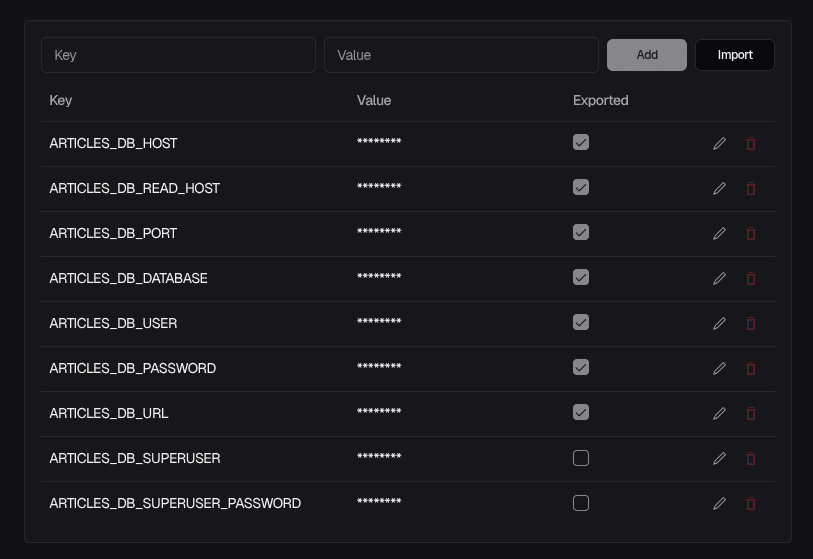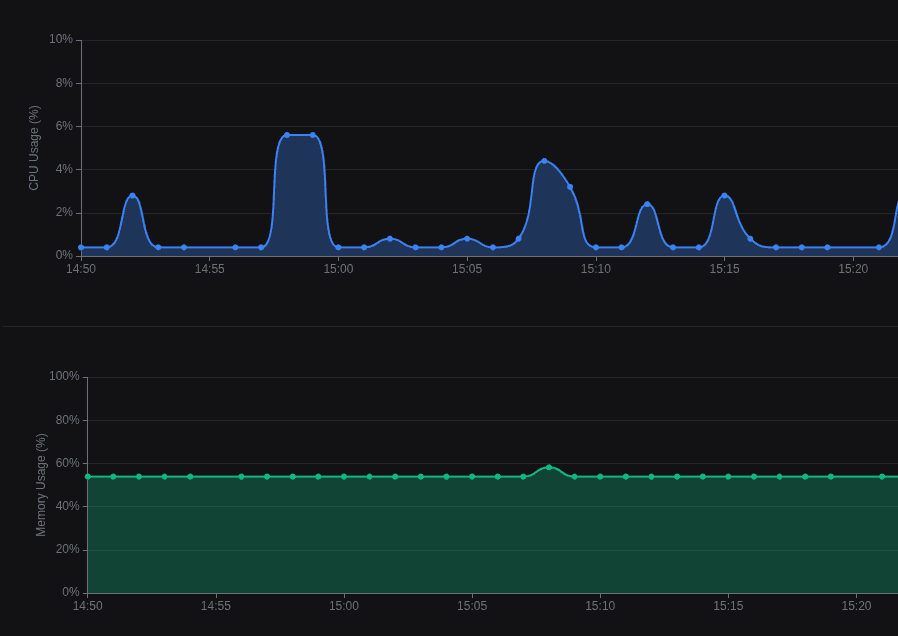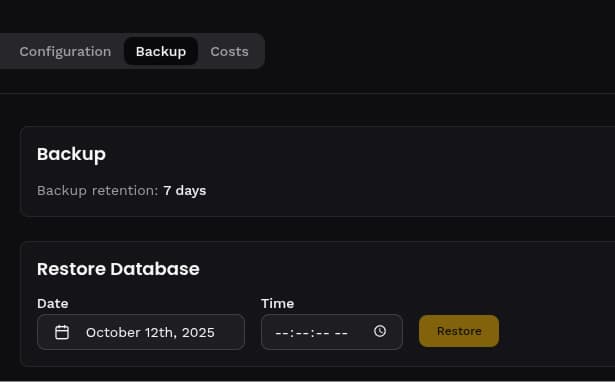Managed databases without the operational burden
Deploy production-ready PostgreSQL databases in minutes. Zero administration, automatic backups, built-in high availability. Focus on building features, not managing infrastructure.
Building apps shouldn't mean becoming a DBA
Traditional database deployments force you to master replication, failover, backup strategies, and performance tuning. Orbit handles all the complexity while you focus on your application.
Complex setup & configuration
Manual backup management
High availability complexity
From configuration to production in three steps
Orbit streamlines database deployment. No complex setup, no database administration expertise required.
Choose your database
Select PostgreSQL and configure your compute resources. See real-time cost estimates as you build your configuration.
Configure replication
Enable read replicas and high availability with simple toggles. No manual replication setup required.
Deploy and scale
Launch your database cluster. Automatic backups, monitoring, and scaling handle the rest.
Enterprise-grade database features built-in
Every Orbit database comes with production-ready capabilities out of the box. No plugins, no add-ons, no complex configuration or database administration expertise required.
Instant provisioning
Deploy production-ready database clusters in minutes. No hardware procurement, software installation, or complex infrastructure planning.
Built-in high availability
Automatic failover and built-in redundancy. Your database stays online during failures without manual intervention.
Read replication
Scale read workloads with automatic read replicas. Improve performance for read-heavy applications without manual replication setup.
Automated backups
Continuous incremental backups with point-in-time recovery. Protect your data without manual backup schedules or testing.
Zero downtime resizing
Scale compute and storage resources without interrupting connections. Adapt to changing demands seamlessly.
Enterprise security
Encrypted at rest and in transit. Network isolation, access controls, and security patches managed automatically.
PostgreSQL - The world's most advanced open-source database
Orbit currently supports PostgreSQL, with MySQL, MongoDB, and more coming soon. Get all the power of PostgreSQL without the operational complexity.
PostgreSQL
ACID-compliant relational database with advanced features for modern applications.
Full ACID compliance
Complete transactional integrity with atomicity, consistency, isolation, and durability guarantees.
Advanced indexing
B-tree, Hash, GiST, GIN, and more. Optimize query performance for any workload pattern.
JSON support
Native JSON and JSONB data types. Build flexible schemas while maintaining relational integrity.
Full-text search
Built-in full-text search capabilities without needing external search engines.
Robust extensions
Rich ecosystem of extensions for geospatial data, time-series, and specialized workloads.
Multi-version concurrency
MVCC architecture enables high concurrency without read locks affecting performance.
Coming Soon
MySQL
Q1 2026

MongoDB
TBA

Cassandra
TBA
High availability without the complexity
Orbit ensures your database remains accessible during failures through automatic failover and built-in redundancy. No manual failover procedures, no complex replication setup.
Automatic failover
When primary instances fail, secondary replicas are automatically promoted. Your applications stay online without manual intervention.
Multi-zone redundancy
Database replicas distributed across availability zones. Protection against zone failures without complex multi-zone setup.
Zero-data-loss mode
Synchronous replication ensures zero data loss during failover. Your critical data is always protected.
Health monitoring
Continuous health checks detect issues before they impact your application. Proactive problem resolution.
Every type of application
Reliable data layer for web apps
Power your web applications with a database that scales with your growth. Automatic backups and high availability ensure your users' data is always safe and accessible.
- ✓Built-in connection pooling
- ✓Automatic failover for 24/7 uptime
- ✓Read replicas for improved performance
Multi-tenant database architecture
Build robust SaaS applications with database isolation and security. Scale effortlessly as you add customers without complex sharding or partitioning.
- ✓Row-level security for multi-tenancy
- ✓Zero-downtime scaling
- ✓Automated backup and recovery
High-performance analytics workloads
Run complex analytical queries without impacting your production workload. Read replicas and advanced indexing handle demanding analytics efficiently.
- ✓Dedicated read replicas for analytics
- ✓Advanced query optimization
- ✓Full-text and spatial search
Database tools that don't get in your way
Connection strings
Get connection strings instantly. Standard PostgreSQL protocol means your existing tools and libraries work out of the box.


Performance insights
Monitor query performance, connection stats, and resource utilization in real-time. Identify bottlenecks before they impact users.


Point-in-time recovery
Restore your database to any point in time with a few clicks. Recover from mistakes or data corruption quickly and easily.


Backups that actually work when you need them
Comprehensive backup and recovery capabilities that operate automatically. Continuous incremental backups combined with point-in-time recovery protect against any data loss scenario.
Continuous incremental backups
Every transaction is captured. Minimal performance impact while ensuring complete data protection.
Point-in-time recovery
Restore to any specific moment in time. Recover from accidental deletions or application errors with precision.
Automated retention
Backup retention policies managed automatically. Balance data protection with storage costs effortlessly.
One-click restore
Restore backups to new database instances with a single click. Test restores or create development environments easily.
Start free, scale as you grow
Launch your first database completely free with 125m CPU, 512MB RAM, and 5GB storage. No credit card required. When you're ready to scale, pay only for resources with no hidden fees.
Resource-based pricing
Pay for CPU, memory, and storage. No per-connection fees or query charges. Real-time cost estimates as you configure.
No database administrator needed
Save on hiring DBAs or consultants. Orbit handles all administration, tuning, and optimization automatically.
Backup storage included
Automated backups included at no additional cost. No separate backup infrastructure to purchase or manage.
Built on enterprise-grade infrastructure
Compute
Availability
Backup & Recovery
Performance
Deploy your database in minutes
Join teams who've eliminated database administration complexity and shipped faster with Orbit.
Frequently asked questions
Do I need database administration experience to use Orbit?
No! Orbit is designed to eliminate the need for database administration expertise. All routine maintenance, security patches, replication setup, and backup management are handled automatically. You can focus on building your application while Orbit handles the operational complexity.
How does high availability work?
Orbit maintains multiple database replicas across different availability zones. If the primary instance fails, a secondary replica is automatically promoted within 30 seconds. Your application's database connections are maintained, and there's zero data loss with synchronous replication enabled.
What happens to my data during scaling operations?
Orbit performs zero-downtime scaling. When you resize your database, the changes are applied seamlessly without interrupting connections or causing service disruptions. Your application continues operating normally throughout the scaling process.
How do backups work?
Orbit continuously captures incremental backups throughout the day, combined with scheduled full backups. This provides point-in-time recovery capability, allowing you to restore your database to any specific moment within your retention period. Backups are automated and require no manual intervention.
Can I connect using standard PostgreSQL tools?
Yes! Orbit provides standard PostgreSQL connection strings. Any PostgreSQL-compatible tool, client library, or ORM works seamlessly. Use psql, pgAdmin, DBeaver, or your favorite database tool without any special configuration.
How are read replicas different from high availability replicas?
High availability replicas are for failover protection and maintain synchronous replication with the primary. Read replicas are for scaling read workloads and use asynchronous replication. You can have both HA replicas and read replicas in the same cluster.
What security measures are in place?
Orbit encrypts all data at rest using AES-256 and in transit using TLS. Databases are deployed in isolated networks with configurable access controls. Security patches are automatically applied during maintenance windows. You maintain full control over database credentials and access policies.
Can I restore a backup to test it?
Absolutely! You can restore any backup to a new database instance with one click. This is perfect for testing your backup strategy, creating development environments, or investigating issues without affecting your production database.
When are MySQL and MongoDB coming?
MySQL and MongoDB support are planned for Q1 2026. We're starting with PostgreSQL to deliver the best possible managed database experience, then expanding to support more database engines based on user demand.